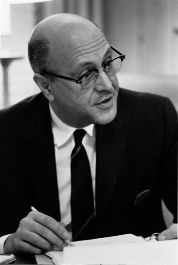 Robert Clifton Weaver was born December 29, 1907 in Washington, D.C. and attended Dunbar High School. During his teenage years, he did electrical work and attempted to join a labor union but faced discrimination, and opted to concentrate on his studies. Weaver enrolled in Harvard University eventually received a Ph.D. in economics in 1934. His grandfather, Dr. Robert Tanner Freeman, was the first Black to receive a medical degree in dentistry at Harvard. One year after completing his studies at Harvard, Weaver married Ella Haith. The couple had an adopted son who died.
Robert Clifton Weaver was born December 29, 1907 in Washington, D.C. and attended Dunbar High School. During his teenage years, he did electrical work and attempted to join a labor union but faced discrimination, and opted to concentrate on his studies. Weaver enrolled in Harvard University eventually received a Ph.D. in economics in 1934. His grandfather, Dr. Robert Tanner Freeman, was the first Black to receive a medical degree in dentistry at Harvard. One year after completing his studies at Harvard, Weaver married Ella Haith. The couple had an adopted son who died.
Early in his career Weaver served as an aide to Secretary of the Interior Harold Ickes in President Franklin D. Roosevelt’s administration. He was part of a group of young, Black professionals known as the “Black Cabinet.” The head of that group was Mary McLeod Bethune and it included such history makers as Ralph Bunche and William Henry Hastie. It was during the Roosevelt era that Weaver developed expertise in urban policy and housing in particular.
In 1944 Weaver left Washington to take on the role of Executive Director of the Mayor’s Commission on Race Relations in Chicago. Later in the decade he would become a lecturer at Northwestern University in Evanston, Illinois, a visiting professor at Teachers College at Columbia University, and at the New York University School of Education. During this time he was also a professor of economics at the New School for Social Research. At the end of the decade he became Director of the Opportunity Fellowships Program at the John Hay Whitney Foundation, a consultant to the Ford Foundation, and chair of the Fellowship Committee at the Julian Rosenwald Fund.
In 1955 Weaver was named Deputy State Rent Commissioner by Governor Averell Harriman of New York and within the year became Commissioner, making Weaver the first Black to reach Cabinet rank in state government.
Dr. Weaver was an authority on the plights of Blacks and the urban condition in America, authoring Negro Labor: A National Problem (1946), The Negro Ghetto (1948), The Urban Complex: Human Values in Urban Life (1964), and Dilemma’s in Urban America (1965).
Dr. Weaver was tabbed early on by President John F. Kennedy to lead the new administration’s housing program. Kennedy, however, ran into opposition from Republicans and southern Dixiecrats as he attempted to create a new federal agency focused on housing. It was an initiative picked up by Lyndon Johnson after the tragic assassination of Kennedy in 1963. In the interim Weaver served as the Administrator of the Housing and Home Finance Agency. When the Department of Housing and Urban Development (HUD) was created in 1965 Dr. Weaver was the most likely choice to be the Cabinet Secretary but President Johnson was concerned that his academic persona was not suited for Washington politics. Johnson also faced opposition to Weaver among Southern senators.
Eventually a reluctant Johnson was convinced by Thurgood Marshall that Weaver would be the best suited to lead the department. Marshall’s endorsement was echoed by Johnson staffer Bill Moyers, who prepared a briefing paper on Weaver for the President and concluded that the Harvard economist was a top notch administrator who had accomplished much during his leadership of HHFA. President Johnson was satisfied by the evaluation of Weaver by Marshall and Moyers, and nominated Dr. Weaver to be Secretary of HUD on January 13, 1966. It made Robert Weaver the first Black to serve on a President’s Cabinet.
Following his tenure at HUD, Dr. Weaver returned to New York in 1969 to become the president of Baruch College, and then became a professor of Urban Affairs at Hunter College in the city. He retired in 1978. Dr. Weaver died on July 17, 1997 at the age of 89, his wife having predeceased him. The Department of Housing and Urban Development’s building in the nation’s capital was renamed the Robert C. Weaver Federal Building in his honor in 2000.

today in black history
July 27, 2023
Audley "Queen Mother" Moore, one of the first activists to demand reparations for slavery, was born in 1898 in New Iberia, Louisiana.
Black History Profile
Robert C. Weaver
POSTED: February 04, 2009, 12:00 am




















